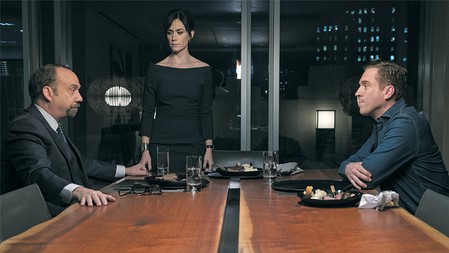Emmys: Supporting Actor Categories are Ensembles of Riches (Column)
By Cynthia Littleton
LOS ANGELES (Variety.com) – It’s the kind of abstract problem a high-strung trader at Axe Capital might bring to Maggie Siff’s all-knowing performance coach Wendy Rhoades on Showtime’s “Billions”: How do you define a supporting role at a time when shows, particularly high-end dramas, feature increasingly large ensemble casts? Serialized storylines often bounce the focus around among core characters to keep the pot boiling.
The “” season three episode “Not You, Mr. Dake” is a good example. It’s hard to argue that Siff’s character is not the lead in this episode: Wendy instigates a morally bankrupt scheme involving her husband, Paul Giamatti’s Chuck Rhoades, and Damian Lewis’ Bobby Axelrod. Watching Wendy succumb to behavior that shatters her illusion of living by high ethical standards was the most compelling part of the hour.
“Orange Is the New Black,” “The Good Fight,” “The Americans” and “Stranger Things” are other examples of the spread-the-wealth approach to storytelling.
Christine Baranski is unquestionably the lead of “Good Fight,” but there are episodes in which Delroy Lindo, Audra McDonald and Cush Jumbo do heavy lifting, too. The same goes for Noah Emmerich and Holly Taylor on “” opposite Keri Russell and Matthew Rhys. One seasoned Emmy awards consultant notes that issues of screen time for supporting players has become a point of contention at times for shows when selecting the six episodes that each comedy and drama series nominee submits for the final awards-round of judging.
Siff has been a standout on “Billions” from the start. But the Showtime drama did not break into the Emmy race in its first two seasons, a surprise given that Giamatti and Lewis are both past Emmy winners (Giamatti for “John Adams” in 2008 and Lewis for “Homeland” in 2012).
Siff and her “Billions” co-stars David Costabile and Asia Kate Dillon are seen as strong contenders this year after knockout performances in season three. But it’s typically hard (though not unheard of) for actors on drama series with large ensemble casts to draw Emmy nominations if the show and its stars are not in the mix. Think “Friday Night Lights,” which didn’t grab any Emmy love until the final two years of its run. And remember that “Mad Men” only took home a single acting Emmy in its entire run, for Jon Hamm’s work in the final season, despite a boatload of nominations for its rock-star ensemble: Elisabeth Moss, John Slattery, Christina Hendricks, Robert Morse and Jared Harris.
Last year, “The Crown,” “Stranger Things,” “Better Call Saul,” “House of Cards,” “Westworld,” “This Is Us,” and “The Handmaid’s Tale” dominated the supporting actor and actress fields. Those were also the Magnificent Seven contenders for best drama series.
“Serialized storylines often bounce the focus around among core characters to keep the pot boiling.”
The comedy supporting actor field has been more varied. Louie Anderson’s win for FX’s “Baskets” is one of the more left-field victories in recent years. Max Greenfield of “New Girl” and Andre Braugher of “Brooklyn Nine-Nine” landed nominations even though their shows were not in the top comedy series category.
Here’s hoping Emmy voters have the time and energy to survey the wider-than-ever field of contenders and find some overlooked performances worthy of the Emmy spotlight. Supporting actor categories should be a place to recognize the great character players working round the clock these days. (A handful of actors including Caitlin FitzGerald and Costa Ronin may potentially have two supporting actor submissions this year.) These fan-favorite thespians are so crucial to the longevity of a series.
It’s hard for any show to stand out amid a sea of choices in the peak TV era. But there may be no harder job for an actor than standing out in the ensemble when the playing field is so deep and so wide.

